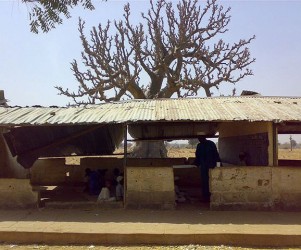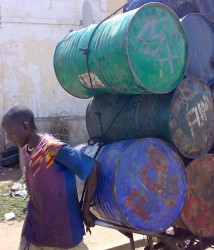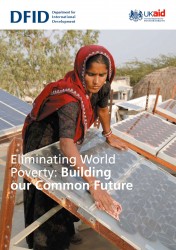Awareness on climate change and the need for long term adaptation has been relatively slow to develop in Nigeria - 'Naija' in local slang - and with understandable reason. Some developing countries have never had major industrialisation or modern infrastructure, so the debate is rightly around how to ‘leap frog’ the historical development path and make use of the latest green technologies that minimise emissions and so forth.

Nigeria however, had its oil bonanza in the 1960 – 70s and while flush with petrodollars quickly developed infrastructure, for example the manufacturing estates in Kano, which are now in terminal decline. Drive through the industrial zone close to my home when the winter Harmattan winds blow dust off the Sahara and you could well imagine you are in a Mad Max movie; a post nuclear apocalypse without Tina Turner. A scene of rusting, empty warehouses, twisted metal structures and street urchins scavenging waste plastic and cardboard to sell or burn to keep warm.

I’ve already highlighted the massive environmental damage that arises from gas flaring and deforestation (mostly for firewood), caused by the failures to capture and use natural gas or to maintain a functional supply of electricity. Emissions are high and people die in the resulting violence as a growing population clash for depleted natural resources.
A non governmental alliance: Nigeria Environmental Study/Action Team (NEST) has been particularly active to sensitise and empower Nigerians on issues of the environment and sustainable development; it has created a useful series of fact sheets that summarise the potential threats and solutions in human settlement, health, water resources, ecology, economy, agriculture and bio-diversity.
To the government’s credit, climate change is slowly moving on to the political agenda. The new Special Climate Change Unit of the Federal Ministry of Environment acknowledges openly the problems, for example noting that over a third of Nigeria’s forest reserves have gone since 1990. Renewed efforts are underway to prohibit gas flaring such as the global clean development mechanism (CDM).

The Copenhagen conference will be important to offer Nigeria incentives and support in tackling climate changes. DFID is considering how best to step up its support as detailed in the recent White Paper: Building our Common Future. A set of good governance reforms are essential and additionally make huge economic sense: why does an oil exporter have to import the majority of its refined petrol and diesel?
This is why raising awareness in Nigeria’s citizenship on climate change is also so vital, to lobby hard for reform. DFID supports the Nigeria Climate Action Network (NigeriaCAN); a web of groups and individuals in Nigeria working to promote government and individual action to combat climate change.
This blog features as part of Blog Action Day and the Act on Copenhagen campaign




2 comments
Comment by jawad Muhsin posted on
Although climate change is a global phenominon, it is vital to tackle the regional contributors, Africa is an integral part of the problems. Nigerian forestory resources has been depleating partly due partly to poverty, we need to address the poverty issues in this region of the world.
Comment by Scott Ecoses posted on
Recycling is important. How much do we, as a nation throw away? How much of it can be turned into something useful which could aid the developing world?
We burn much of our waste for fuel.